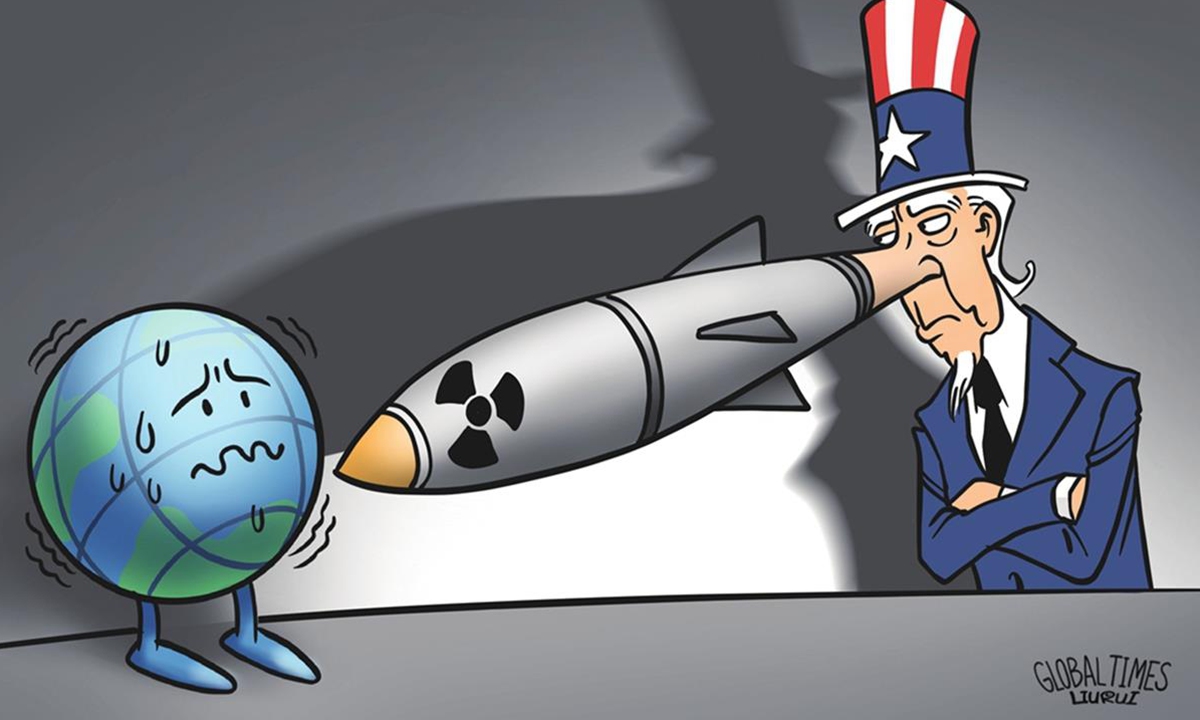
Illusion: Liu Rui
The US and Russia have agreed to hold talks on resuming inspections under the New START nuclear arms reduction treaty in the near future, according to US State Department spokesperson Ned Price.
The treaty is the single existing one between the two major powers which limits all deployed intercontinental-range nuclear weapons by the two. In August this year, Russia temporarily suspended on-site US inspections of its strategic nuclear weapons, citing reasons that US sanctions imposed on Russia over Ukraine had changed conditions between the countries.
As the Ukraine crisis intensifies, the debate of the possibility of a nuclear war has followed suit. This has increased anxiety of the international community over a nuclear crisis. Just last month, NATO kicked off its annual nuclear exercise, dubbed Steadfast Noon, and Russia launched its scheduled Grom strategic nuclear exercises about a week later.
Both the US and Russia have realized that it is not in their respective interests when nuclear powers continue to consume their strategic nuclear forces, and it is not in their respective interests either that bilateral relations spiral out of control. Once a nuclear war occurs, there will be no winner. More than 5 billion people would die of hunger following a full-scale nuclear war between the US and Russia, according to a global study released in August.
Cui Heng, an assistant research fellow from the Center for Russian Studies of East China Normal University, believes that the resumption of nuclear talks is an obvious sign of the easing of the Ukraine situation.
"The US and Russia are sending signals to each other as well as to the international community that they have the bottom line regarding nuclear weapons. In other words, no matter what direction the Ukraine situation goes, this bottom line will be adhered to," said Cui, adding that the Russia-Ukraine conflict has come to a critical juncture where patience is declining and intensity on the battlefield may escalate.
In this conflict, the US does not want to walk out from behind the scene. Although the US keeps sending military aid to Ukraine, it just wants to keep Ukraine at the frontline. According to the Washington Post, the Biden administration is privately encouraging Ukraine to signal an openness to negotiate with Russia. The request by American officials is not aimed at pushing Ukraine to the negotiating table, rather, a calculated attempt to ensure the government in Kiev maintains the support from other nations, the report said citing sources.
The US initiated the crisis in order to weaken Russia, not to actually get involved in it, not to mention a nuclear one. Maintaining communications with Russia best fits US interests. The Wall Street Journal reported that US national security adviser Jake Sullivan has engaged in recent months in confidential conversations with top aides to Russian President Vladimir Putin in an effort to reduce the risk of a broader conflict over Ukraine.
Su Xiaohui, deputy director of Department of International and Strategic Studies at the China Institute of International Studies, told the Global Times that on the one hand, the US makes efforts to keep contact with the Russian side and prevent the relations of the two big nuclear powers from getting out of control; on the other hand, it tries to maintain the anti-Russia mood in the West and let its European allies share more responsibilities so as to consume and contain Russia strategically.
Putin has denied having any intentions of using nuclear weapons in Ukraine. The US, however, has decided to speed up the deployment of B61-12 nuclear bombs in Europe. If there is a country most likely to cause a nuclear war amid the Russia-Ukraine conflict, it is the US. The US and the West should be responsible for the fragile international nuclear non-proliferation system. Driven by the Cold War mentality, the US has strengthened its political and military alliances, sought absolute strategic advantages, and promoted the forward deployment of strategic forces such as nuclear missiles, and attempted to replicate NATO's "nuclear sharing" model in the Asia-Pacific region. This series of negative moves is the crux of the international "nuclear tension." The US is self-contradictory when it is worried about nuclear war but at the same time promoting nuclear proliferation.
The US is the largest nuclear power in the world and should bear the main responsibility for nuclear non-proliferation. Since it often touts about the West-centric world order, it should bear its due share of responsibility when enjoying the power brought about by that order.




